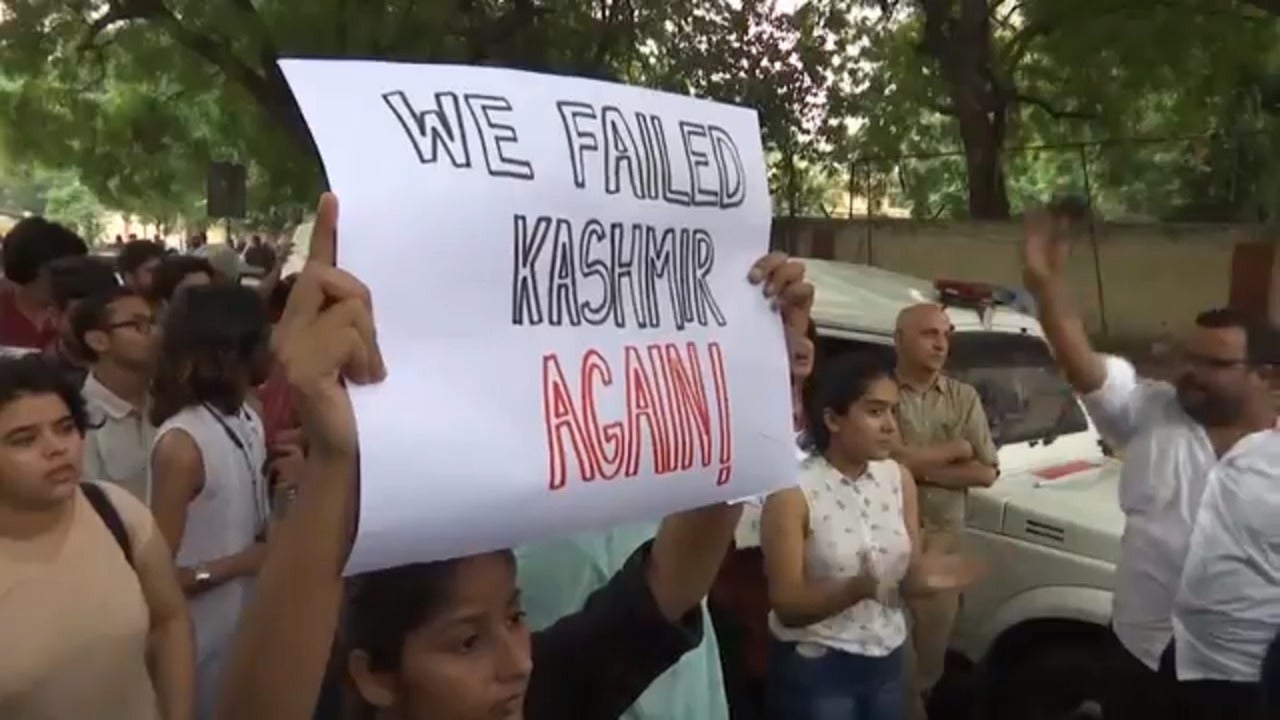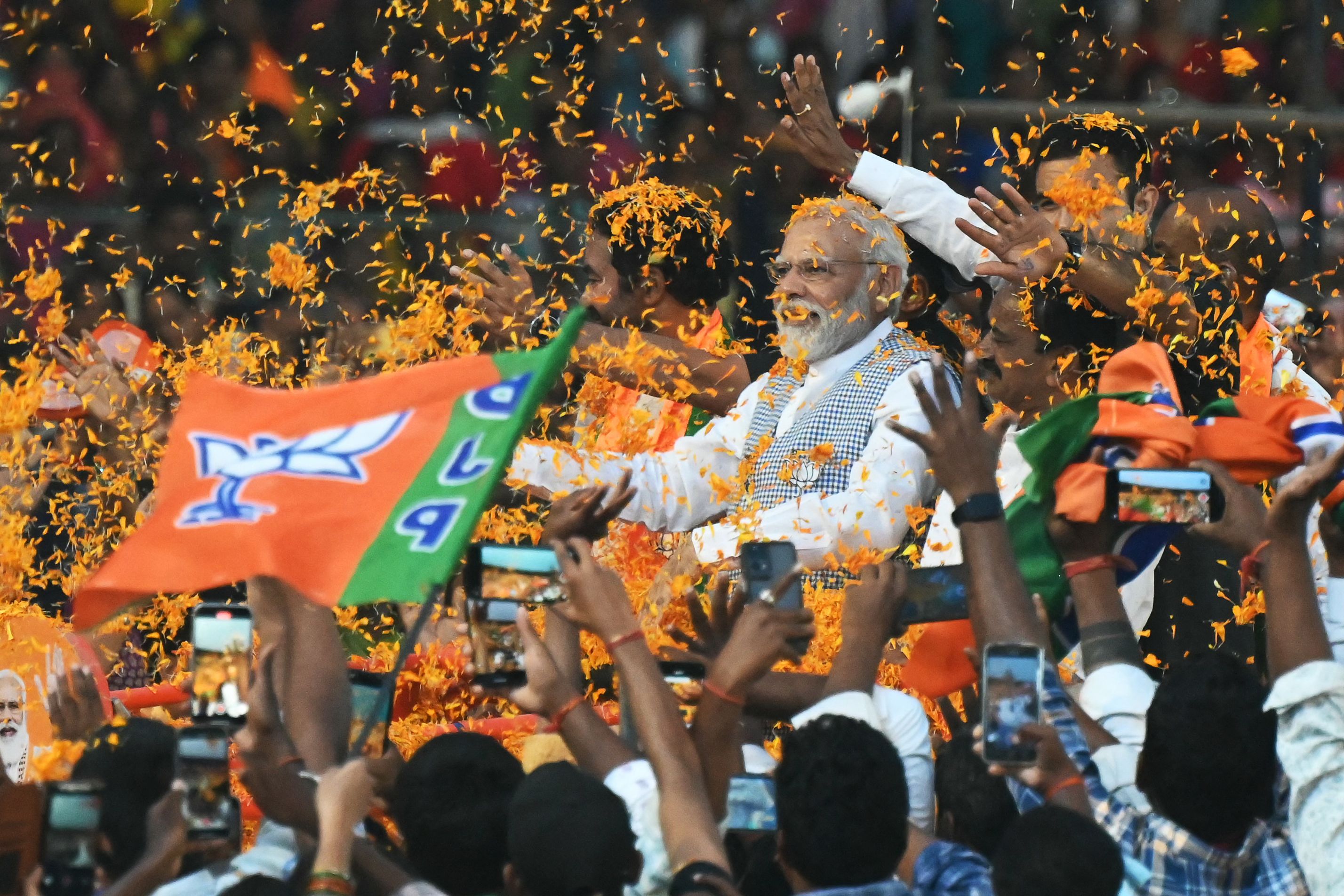Article 370: What removing Kashmir’s special status means for the region’s future
Kashmiri voices react cautiously to India’s Supreme Court upholding a 2019 decision by prime minister Narendra Modi’s government to revoke Article 370 of the constitution which granted special status to Jammu and Kashmir. Maroosha Muzaffar reports

India’s Supreme Court has upheld the Narendra Modi government’s decision to revoke the special status of Jammu and Kashmir, a constitutional clause that allowed the country’s only Muslim-majority region a high degree of devolved power.
The 2019 decision to revoke Article 370 was accompanied by a massive lockdown by the Indian security forces and a months-long shutdown of internet access for people living in the region, such was the concern from New Delhi that it would be met with unrest.
As well as revoking the clause, in 2019 the government withdrew the region’s statehood and divided it into centrally-controlled union territories. The combined reforms were immediately met with legal petitions questioning their constitutionality.
On Monday the Supreme Court ruled in favour of the government, finding that Article 370 was only ever a “temporary” provision and that its revocation was “constitutionally valid”. Modi’s ruling Bharatiya Janata Party (BJP) celebrated the court’s ruling as “historic”.
In Kashmir, some of the security measures that have eased since 2019 were again briefly put in place ahead of the Supreme Court ruling. On social media, some local voices expressed cautious discontent with the ruling. “Not surprising”, wrote one, while adding the fear that many Kashmiris share – that this will lead “the way for a complete demographic and cultural change”.
What is Article 370?
Article 370 was added to the Indian Constitution soon after the partition of 1947, dividing British-ruled India into two countries: India and Pakistan. This granted special status to the then-princely state of Jammu and Kashmir. It also limited India’s control over the region, which meant that the centre could not make laws for Jammu and Kashmir.
A related provision under Article 370 – Article 35A – gave lawmakers in the former state powers to decide who could buy land in the region and who could be a permanent resident. The special status meant that the state was allowed to have its own constitution and flag and decision-making powers.
Professor Noor Ahmed Baba, a renounced Kashmiri political science academician, tells TheIndependent that Article 370 was “introduced at a time of great political turbulence” in Kashmir. He says that at that time, India “wanted to win over the local leadership here (in Kashmir) and as a result of the negotiations, Article 370 was introduced”.
It is important to note that in April 2018, the Supreme Court said Article 370 had acquired permanent status through years of its existence, hence making its abrogation impossible.
“Supreme Court has made an unthinkable kind of interpretation,” says PDT Achary, former general secretary of Lok Sabha. He says the verdict undermines constitutional procedure. Article 370 specified that it can only be abrogated by the consent of the legislative body that crafted the state constitution. That body dissolved itself in 1957.
What it means for future of Jammu and Kashmir
Kashmir has long been the primary thorny issue between nuclear-armed neighbours India and Pakistan, with the two countries fighting three wars over the Himalayan region since independence.
In the 1990s, an armed rebellion against Indian rule erupted in the valley, which has ebbed and flowed ever since despite a huge and constant presence of Indian security forces in the region. The authorities have been accused of clamping down on all kinds of civil liberties as well as dissent in its efforts to contain this militancy.

In 2019, the BJP government locked down the entire region and detained its political leadership. Activists, separatists and pro-India politicians, lawyers, and students were thrown into jails for months and a complete communications blockade was imposed.
The BJP has always believed that the special status granted to the region was a step towards separatism. With the Supreme Court verdict, the BJP has moved one step closer to achieving its intended goal of fully integrating Kashmir with the rest of the country.
Professor Siddiq Wahid, a senior visiting fellow at the Centre for Policy Research in New Delhi, says the verdict “contravenes our expectations” but “at the same time, it’s not a surprise”.
“You know, we’ve known the position that the government takes on this whole thing. In fact, since yesterday, there’s been a lot of speculation but I think the expectation in Srinagar was not much different than that ‘we expected this’.”
Home minister Amit Shah recently said in parliament that Article 370 was “the root cause” of separatism and terrorism in the region. On Monday, he struck a celebratory tone in his message on X/Twitter. “Under the leadership of PM [Narendrea Modi] our government is committed to establishing lasting peace in [Jammu and Kashmir] and Ladakh and the all-around development of the region.”
Modi said: “The Court, in its profound wisdom, has fortified the very essence of unity that we, as Indians, hold dear and cherish above all else. I want to assure the resilient people of Jammu, Kashmir and Ladakh that our commitment to fulfilling your dreams remains unwavering.”
However, in Kashmir the verdict was seen as yet another blow. Haseeb Drabu, former finance minister of Jammu and Kashmir, wrote in the Indian Express that “the promise of abrogating Article 370 was first made 70 years ago and is a part of every single electoral manifesto of the BJP. No matter what the constitutional process and procedural infirmities, it was bound to be upheld, one way or another. Not to speak of the high political stakes, domestic and international, in Kashmir.”
The people and their human rights need to be at the heart of the steps taken ahead in Jammu and Kashmir
Following the abrogation of Article 370 in 2019, the Indian government reorganised the former state of Jammu and Kashmir into two federal territories – Ladakh and Jammu and Kashmir. Ladakh became a federal territory without a legislature, while Jammu and Kashmir retained a legislative body. Since 2019, both territories have been administered by centre-appointed lieutenant governors in the absence of assembly elections.
Prof Baba says: “Many people will view it (the SC’s stamp on BJP’s decision) as a betrayal of trust.” He adds: “Kashmir was the only Muslim majority state within the larger country. Historically, people in Kashmir have always been identity-conscious. They saw it (Article 370) as an instrument of safeguarding their identity despite its erosion.”
He notes that the special status which restricted outsiders from buying land and getting permanent citizenship there, ensured that local residents got their share of government jobs. “J&K doesn’t have many economic opportunities and so people are mostly dependent on services (government jobs).” He adds: “Now those jobs are open to people from all across the country.”
Though the Supreme Court verdict mandates that elections be held in Kashmir by September 2024, the question of what happens next in the region remains unclear.
Following the annulment of Article 370, a subclause called Article 35A was also abolished, which had prevented non-Kashmiris from purchasing property in the region. This move has fuelled concern from locals that India plans to orchestrate a demographic shift in the Muslim-majority region.
Prof Baba feels that “this will lurk in the minds of people” and he believes that “we’ll only get to know the extent of the resentment among locals when elections happen”. He says that once statehood is restored and an elected government is in place, it would push to “safeguard the interests of the people of the state”. That’s the bare minimum he expects from the local lawmakers.
Aakar Patel, chair of the board at Amnesty International India, says in a statement: “For decades, the people of Jammu and Kashmir have faced grave abuse of their rights to physical and mental integrity, including arbitrary detention and unlawful killings, and to their freedoms of expression movement and from discrimination. The situation only exacerbated for them following the abrogation of Article 370 in 2019.”
“The people and their human rights need to be at the heart of the steps taken ahead in Jammu and Kashmir,” he adds.
What other changes can we expect?
The Modi government is also planning on introducing a bill in parliament that would reserve 33 per cent of places in Jammu and Kashmir’s legislative assembly for women.
Shamima Firdous, the women’s wing president of National Conference – one of the main regional parties – says it was “a welcome move as it would help in dealing with the issues and concerns of womenfolk in a better way. Peoples Democratic Party leader, Syed Asiya Naqash also favoured the move.
How the Supreme Court verdict might boost BJP’s poll prospects
India is due to go to the polls in April or May next year, and the Supreme Court verdict is seen as the latest development that will be used by a buoyant BJP to point to its achievements.
Another is the inauguration of the Ram Temple at Ayodhya next month, constructed at what some believe to be the birthplace of the Hindu deity Lord Ram. After a lengthy legal battle it was built at the site where one of India’s most important mosques, the Babri Masjid, was torn down in 1992 by a Hindu mob.

Both moves appeal strongly to the party’s Hindu majoritarian base, experts say.
Prof Wahid says it’s “astonishing timing in terms of how it has been thought through”. He believes that the BJP is “obviously going to” declare the Supreme Court verdict as a vindication of its policies, and show it as an “accomplishment of the party” right before the polls.
What local politicians are saying
Prominent political figures from Jammu and Kashmir have expressed their dissatisfaction with the verdict. Former chief minister Omar Abdullah wrote on X/Twitter on Monday: “Disappointed but not disheartened. The struggle will continue. It took the BJP decades to reach here. We are also prepared for the long haul.”
Mehbooba Mufti of the PDF party, another former chief minister of the state, said: “The SC has said that the Article 370 is temporary, which is why it was removed.
This is not only our defeat but also the defeat of the idea of India. This is the defeat of the imagination of India, the Gandhian India with which Muslims of Jammu and Kashmir, rejecting Pakistan, joined hands with the Hindus, Buddhists Sikhs and Christians, the country of Gandhi.
“Today marks the defeat of that idea of India.”
How has Pakistan responded?
Pakistan was hugely critical of the removal of Jammu and Kashmir’s statehood and the revocation of Article 370 at the time in 2019, seeing it as a tightening of New Delhi’s grip in the region. Pakistan and India both administer parts of the former princely kingdom of Jammu and Kashmir and claim it in its entirety.
“International law doesn’t recognise India’s unilateral and illegal actions of 5 August 2019. The judicial endorsement by the Indian Supreme Court has no legal value,” Jalil Abbas Jilani, a minister in the country’s caretaker government, said. He added: “Kashmiris have an inalienable right to self-determination in accordance with the relevant UN SC resolutions.”
In its editorial published on Tuesday, Pakistan’s English daily Dawn said that the Indian Supreme Court judgement was like “pouring salt on the Kashmiris’ wounds”.
Join our commenting forum
Join thought-provoking conversations, follow other Independent readers and see their replies
Comments
Bookmark popover
Removed from bookmarks